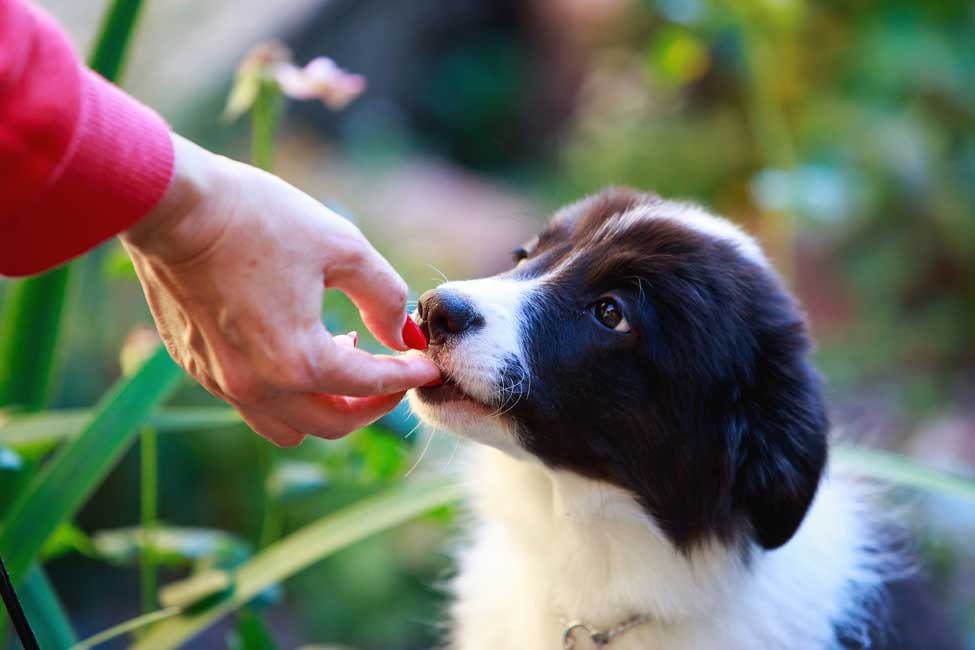
Standard or “Rough” Collies are a wonderful constant in their owner’s lives: loving furry companions that adore being near “their” humans and making them smile. In addition to treating them with plenty of love and affection in return, conscientious pet parents often take a proactive step in researching their pup for breed-specific health issues that may creep up. Thankfully, most of the non-genetic issues are easy to keep at bay with a regular regimen of vet checkups and a healthy Collie diet, but others are present from birth. In the case of the latter, breeders can be proactive by ordering tests, X-rays, and examination of breeding Collies before producing litters.
What types of Rough Collie health problems should pet parents be watching for? What are telltale symptoms that they may show up later in the dog’s life? Because Collies are such a loyal and hardworking breed, they may try to hide discomfort or pain from their owners, making diagnosis more challenging. Put your mind at ease and learn about these six potential ‘red flag’ disorders so that you can keep an eye on your beloved Collie’s health:
Seizures in Collies
When a Collie experiences a seizure without a known cause, it’s usually referred to as “idiopathic epilepsy,” or simply IE. The Border Collie dog breed has been found in testing to be particularly susceptible to this ailment and often requires lifelong daily medication to prevent episodes from occurring. When Collie health problems include a seizure, it may be localized (e.g., a single leg freezes up or begins erratically twitching) or general (the entire body seizes up and potentially convulses.) The presence of IE seizures does not indicate any lack of healthcare or attention on the part of the owner; it’s simply a genetic abnormality that results in overstimulation of the electrical centers of the brain. IE seizures do not have any specific trigger, and while they tend to show up in the first year of a Collie’s life, they can also emerge as late as 6 years after birth. A trusted veterinarian can diagnose IE through a series of tests and determine if treatment is required. If you suspect your dog is suffering from this disorder, contact your vet’s office immediately.
What You Can Do: If your Collie is having a seizure, do your best to make sure they are not in a position where they could hurt themselves, such as the top of a staircase. If they need to be moved, take their hind legs and gently drag them away from the source of potential injury. Your dog is not in pain while they are having a seizure, but they may urinate or defecate as a result of temporarily losing muscle control. They can’t help it, so do your best to reassure them, clean up, and keep an eye on them as they recover. Always mention the frequency and duration of seizures to your vet when discussing your Rough Collie health issues. Additionally, book an emergency appointment if seizures suddenly become longer or more frequent.
Central Progressive Retinal Apathy (CPRA) in Collies
For a breed like the Standard Collie or Border Collie, sight is everything. Without clear, reliable vision, these dogs aren’t able to do the task they’ve been bred for. All the energy they naturally enjoy as a working, athletic breed becomes stifled, unable to find an appropriate outlet because their vision is impaired. CPRA is a devastating disorder for a sight-reliant dog like the Collie, and the problem begins with their genetic parents. A dog afflicted by this genetic disorder will slowly lose their vision over time as the superficial layer of the retina wears away, making them sensitive to light and eventually unable to see. Breeders test their Collies extensively to prevent CPRA (among other problems) from spreading; if a breeding dog is found to carry the gene, they’ll generally be kept as a pet rather than being used to produce more potentially afflicted Border Collie puppies. Not all breeders are scrupulous, however, which is why it’s important to research any Collie breeder thoroughly before purchasing a puppy from them.
What You Can Do: Once a Collie has been diagnosed by a vet with CPRA, there is no curative treatment available, though owners can help to alleviate the symptoms. Clearing a path for the dog in the home, always keeping their food and water bowls in the same location, and using your voice to guide them will all aid in managing their new world. While your Collie won’t go blind overnight, it’s best to start a low-vision routine that they can learn and take comfort in if and when their vision eventually vanishes completely.
Collie Eye Anomaly in Collies
This aptly-named disorder is specific, unsurprisingly, to Collie breeds. Affected dogs suffer from a lack of development in the eye blood vessels during their puppyhood, resulting in fuzzy, low, or even missing patches of vision as an adult dog. Like CPRA, this health concern has a huge life impact on a busy, alert Collie, so do your best to help ease them into a life with compromised vision. In some cases, an optics-trained vet may be able to do a laser procedure (similar to the one used for humans) in order to repair the retina and save a dog’s overall vision.
What You Can Do: Only buy Collie puppies from reputable breeders that perform specific tests for CEA and CPRA. Because CEA is also a genetic problem, the only successful way to truly prevent it is to control the bloodline from which your dog will be produced.
Grey Collie Syndrome (Cyclic Neutropenia) in Collies
Another very specific health disease named for the breed it targets, the so-called “Grey Collie Syndrome” is an extremely serious genetic disorder that severely impacts the dog’s nervous system. It’s so serious that the vast majority of Collies with cyclic neutropenia do not survive beyond puppyhood and the ones that do only live to be one or two years old. The disorder is named for the appearance of a dog affected by CN; the puppy will appear as a very light grey, even in contrast to light merle-coated littermates.
What You Can Do: Unfortunately, unlike most other Collie-specific health issues, CN cannot be treated or cured in any significant way. A Collie diagnosed with this issue should be placed under frequent vet supervision to ensure the best quality of life and remain as protected as possible against infections. There is a genetic test available to ensure that breeding Collie pairs do not carry the gene that causes CN, and reputable breeders should be testing for it before producing Collie litters.
Osteochondritis Dissecans (OCD) in Collies
While most people associate OCD with “Obsessive-Compulsive Disorder,” in Border Collies, this acronym has a different meaning: osteochondritis dissecans. This disease crops up when a Collie’s bones grow too fast for their cartilage to keep up, and it necessitates veterinary and surgical intervention to correct. If left undiagnosed and untreated, it can cause serious and painful issues for an affected Collie in adulthood, which is why it’s important to allow Collie puppies to grow at a natural, sustainable rate. It can be tempting to give them extra food or nutrients to help them grow “big and strong,” but remember: Mother Nature knows exactly what she’s doing with this exuberant breed!
What You Can Do: OCD in Collies is entirely preventable through careful puppy-rearing. Because the issue emerges in a puppy that is packing on pounds or calcium too quickly, experts recommend a careful kibble-based food regimen for your dog’s diet that is easy to portion out and prevents overeating/overfeeding. Additionally, unless specifically ordered by a veterinarian, do not give a Collie calcium supplements: instead, rely on a natural, precisely-formulated dog food to give them the nutrients they need to grow at a proper pace.
Hip Dysplasia in Collies
Contrary to popular belief, hip dysplasia in dogs isn’t due to a trauma or a particular lifestyle change: it occurs from a genetic malformation of the hip socket that is in place from a Collie’s birth onwards. While this particular disorder isn’t as prevalent among other common Collie health problems, it still occurs often enough within the breed to be a concern. The hip socket forms incorrectly around the ball joint of the thigh, leading to a poor fit, arthritis and even dislocation as the body attempts to compensate. In older dogs, this appears less as a “slowing down” and more of a painful effect with every step. In some cases, surgery may need to be done on the joints or hip socket. Thankfully, it’s rare to find this disorder in Collies; reportedly, less than 3% of dogs in the breed are afflicted.
What You Can Do: Again, avoiding dysplasia starts with the breeder: a good breeder should be able to offer comprehensive X-rays that show that a pup’s mother and father both passed the hip dysplasia examination with flying colors. Genetic persistence makes keeping an eye out for this all-too-common disorder challenging, but a dedicated pet parent will take the time to review genetic X-rays in detail. They may also have their Collie X-rayed to be sure the disorder isn’t present, even dormant.
Looking Ahead: Nutrition As Preventative Care
While a diagnosis of any of these canine conditions doesn’t necessarily mean a Collie can’t have a rich, full life, it does indicate that some lifestyle changes may be in order. As a pet owner, it’s important for you to remember that diet and exercise will play a major role in their overall health. If you are the fortunate owner of a Collie with a clean bill of health, an ounce of prevention in the form of good nutrition is always beneficial to your beloved companion. On the other hand, pet parents of Collies faced with health problems can also use “food as medicine”, so to speak, along with proper care and treatment as prescribed by your veterinarian. Incorporating nutritious foods and doggie treats into your dog’s diet – including a natural grain-free dog kibble like Lucy Pet – is an excellent proactive step for supporting overall canine health and quality of life, no matter what their age or condition.
Sources Cited:
- “Collie.” American Kennel Club (AKC.org), (no publish date), https://www.akc.org/dog-breeds/collie/. Accessed December 13, 2019.
- Ward, Ernest, DVM; Updated by Rania Gollakner, BS DVM. “Seizures in Dogs.” VCA Hospitals.com, (no publish date), https://vcahospitals.com/know-your-pet/seizures-general-for-dogs. Accessed December 13, 2019.
- “Border Collie Dog.” PetMD.com, (no publish date), https://www.petmd.com/dog/breeds/c_dg_border_collie. Accessed December 13, 2019.
- “Genetic Welfare Problems of Companion Animals.” Universities Federation for Animal Welfare (UFAW.org.uk), (no publish date), https://www.ufaw.org.uk/dogs/border-collie-idiopathic-epilepsy. Accessed December 13, 2019.
- Acland, Gregory M., B.V.Sc., DACVO, MRCVS, (abstract). “Retinal Disorders in Border Collies.” Border Collie Foundation.org, (no publish date), https://bordercolliefoundation.org/wp-content/uploads/2016/08/Retinal-Disorders-in-Border-Collies.pdf. Accessed December 13, 2019.
- A Helpful Guide to the Best Food for Border Collies: https://www.lucypetproducts.com/blog/helpful-guide-to-the-best-food-for-collie-dogs
- Collie vs. Border Collie: https://www.lucypetproducts.com/blog/collie-vs-border-collie




Leave A Comment
You must be logged in to post a comment.